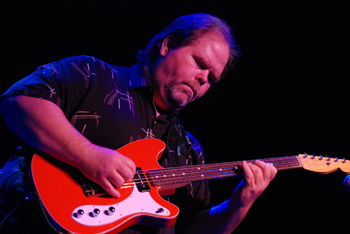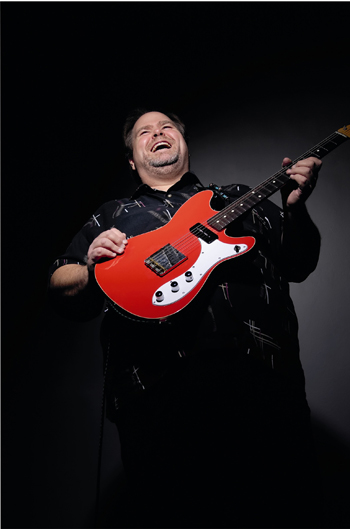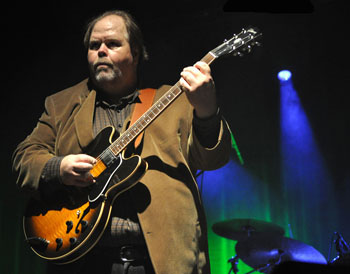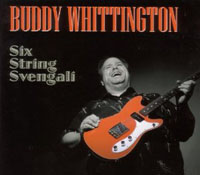
|
||
|
| Interview: BUDDY WHITTINGTON |
In a classic musical example of poacher turned gamekeeper, Buddy Whittington is the latest Bluesbreakers guitarist to make his name with John Mayall before stepping out with his own band.
Buddy's ascent from being a local hero as a respected member of
the Texas club outfit band The Sidemen to international
recognition with John Mayall's Bluesbreakers and his well
received 2007 self titled debut CD was a leap of faith that has
started to repay dividends. But it is with his best yet ' Six String Svengali' solo album that Buddy has developed as a confident song writer and an expressive singer. It also reconfirms his classy guitar playing, the very reason John Mayall hired him for 15 years. Pete Feenstra caught up with Buddy just before his Bedford Blues Festival date in support of his brand new Manhaton records release.
It's been a while since your debut album in 2007 and the new
'
Six String Svengali'. Was it the case of finding the time to
record it or waiting for the right deal? On top of that I also had to go home and spend time with my family, so when you put all that together there's not a lot of time left to work on something new. We did put out a kind of intermediary album with Roger Cotton and my tour band called ' Bag Full of Blues'. But that was really for the people who come and support the band, it was really a bonus for the fans.
For the new album I got together with the same guys I used on my
debut album and I guess we worked from mid February until the
middle of the first week of April, though there was at least a
week when we didn't do anything as we had to work round our
individual schedules and Mike who was producing was either
working in his studio or on the road, and so was I.
There's a song on the new album for example, called '
Fender
Champ' which goes from swing and unison playing to slide and
some nights if I didn't have my slide with me Roger would cover
that part on keyboards , so they are a great band to work with
and a lot of the stuff we play is intuitive. And I thought I'd write a song about how the British Blues invasion and artists like that opened the door for blues and the original guys. I mean a lot of kids near me didn't even know Freddy King was from East Texas for example. I did 'cos I saw him. So yeah songs like that tell a story about what happened at the time. As a matter of fact I took my kids to see ZZ Top when they were making that ' Live From Texas' DVD. I'd seen Billy Gibbons myself when I was 16 in 1972.
Now I know my kids might not be hip to what they are about, but
I think they thought it was pretty cool. It was my way of trying
to show them how I felt when I saw ZZ Top at their age. Then my parents - and my sister in particular - were responsible for me hearing a wide variety of stuff, everything from Country music TV shows to blues and western swing. I always loved guitar led stuff and all sorts of music in general. There was also a vibrant local music scene too with people like Bugs Henderson and Johnny Nitzinger who had a local hit with ' Louisiana Cockfight'. So there was a lot going on all around me.
So were there were enough clubs to keep the bands working
locally?
Strangely enough Texas was the one place where you could still
drink and drive along those long straight roads, not that I'm
condoning that. It was recorded in A flat and I thought about calling it ' A Flat Tyre'. It's about a place I'd go to regularly with members of my family in between tour dates with John Mayall. It's on the Bolivar Peninsula in Southern Texas and was one of the places that got flattened by a hurricane. But they are rebuilding the area now, and it's the sort of place where the people don't give up easily, not least to something like a hurricane.
I
originally wrote it for my wife and had an idea of a funky feel
and horns and whatever, but I ended up liking the simple trio
version as it was, though we did expand the bridge a little with
effects. I'm usually a straight down the line kind of guy but we
experimented a little on that.
A
lot were way too young, in the middle of their prime and the
song is really about the fact that we all too infrequently catch
up with friends. We always say '
see you soon' but we don't see
them often enough, and when we finally do get round to it, its
often too late.
And years later I heard the basis of it in a new context via
Andy Powell and Laurie Wisefield in Wishbone Ash and Dicky Betts
and Duane Allman in The Allman Brothers who both took it in
different directions. It was the same idea of using harmony
lines – but a bit like idea of string band trying to play jazz
with horns (laughs). That was especially so on his 70th birthday gig, when everyone wanted to play and he insisted on using his own band. And I'm eternally grateful to him for having played with people like Clapton and Mick Taylor – he's a great player - and of course Chris Barber.
I
mean it was because of Chris Barber that most of this blues
scene in the UK happened in the first place. He brought lots of
people over. I think John still has a contract of when the
Bluesbreakers played with John Lee Hooker and got paid £90. So I guess I learned how to assert myself a little and to take the 'executive” decisions and how to get along with everyone. I think I've got the idea, though we've had to settle for things like a splitter bus rather than a tour bus and take a view on some of the hotels.
There's a lot been said about how hard John was to work for, but
I think that must have been a long time ago, as his strength
when I was in the band was simply to give everyone enough
rope...
And technically speaking they are stunning, but my view is maybe
they could take a little bit of a break and stretch the energy a
little bit further. I guess that's where the variety of my
musical influences plays its part as I love well constructed
songs with enough room for a solo and a good chorus. I was maybe 13 or 14 and he had a few years on me. His real interest at the time was in my friend's sister, but anyway he heard Peter Green and told me ' man you've got to get hip to Peter Green's Fleetwood Mac'.
So
I started listening to stuff like '
Stop Messin' Round', '
Oh
Well' and Green Manalishi' etc. But the thing is that I love the
way osmosis works in music, because back in the pre SRV days of
Texas I was listening to '
Just Got Back From Baby's' from ZZ
Top's '
First Album' and it sounded just like Peter Green. So
there was I listening to Billy Gibbons being influenced by Peter
Green thousand of miles away on a different continent.
'Six String Svengali' is released via Manhaton Records
Interview © August
2011 Pete Feenstra |
|
get ready to rock is a division of hotdigitsnewmedia group




